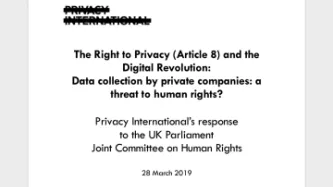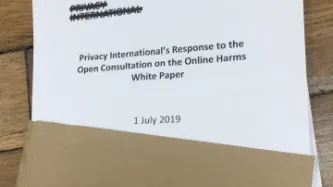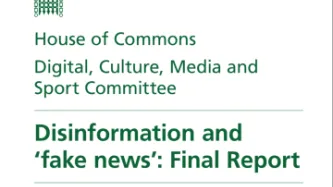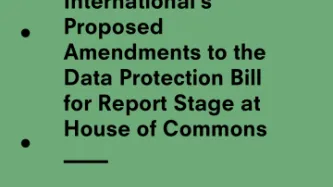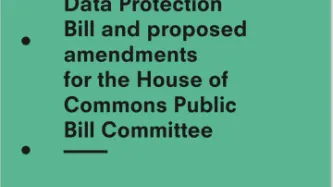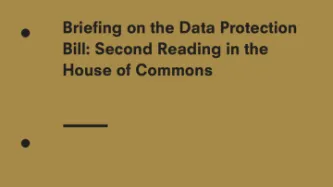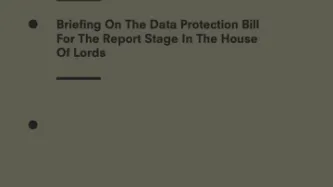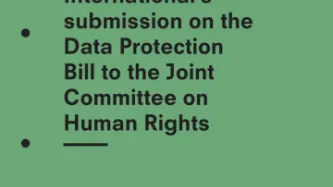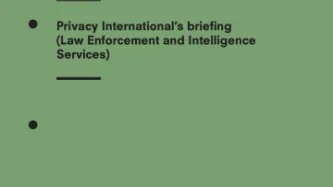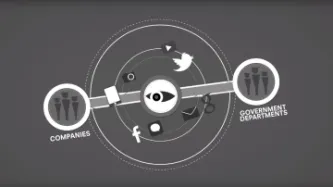Search
Content type: Examples
Following trials in Leicester, Luton, and Blackburn with Darwen, the UK government will assign teams of health care professionals to more than ten local authorities and offer them Public Health England’s near real-time data on infections and a dedicated team of contact tracers, shifting away from its £10 billion centralised national system run under contract by Serco. As of early August, the Serco scheme was still failing to reach a significant proportion of those who had been in close contact…
Content type: Examples
The outsourcing company Serco, which the UK government has contracted to perform contact tracing, accidentally shared the email addresses of almost 300 of the contact tracers it hired when a staff member sent an introductory email and used CC rather than blind CC. Serco does not intend to refer itself to the Information Commissioner's office.
Writer: Ross Hawkins
Publication: BBC
Content type: Examples
After ORG asked questions via its legal representative, AWO’s Ravi Naik, the UK’s Department of Health and Social Care agreed to change the period it would retain Test and Trace data from 20 years to eight. Public Health England manager Yvonne Doyle explained that the novelty of COVID-19 was the reason for keeping the data longer, in case PHE needed to get back in touch with those who had tested positive with additional information.
Publication: ZDNet
Writer: Daphne Leprince-Ringuet…
Content type: Examples
In early July the Open Rights Group issued a pre-action legal letter to UK health secretary Matt Hancock and the Department of Health and Social Care saying they have breached requirements under the Data Protection Act 2018 and GDPR by failing to conduct an impact assessment for the Test and Trace system. ORG and its lawyers, AWO, had been asking for details of the DPIA since the beginning of June, a few days after the system was launched. In their response, the DHSC’s lawyers said “there were…
Content type: Examples
Hours before OpenDemocracy filed suit to compel the UK government to release all the contracts governing its deals with a list of technology firms including Amazon, Microsoft, Google, Palantir, and Faculty, the UK government released the contracts. Faculty is being paid more than £1 million to provide AI services for the NHS, and the companies involved in the NHS data store project, including Faculty and Palantir, were originally granted intellectual property rights and were allowed to train…
Content type: Examples
The AI firm Faculty, which worked on the Vote Leave campaign, was given a £400,000 UK government contract to analyse social media data, utility bills, and credit ratings, as well as government data, to help in the fight against the coronavirus. This is at least the ninth contract awarded to Faculty since 2018, for a total of at least £1.6 million. No other firm was asked to bid on the contract, as normal public bodies’ requirements for competitive procurement have been waived in the interests…
Content type: Examples
On March 20, the UK's Department of Health and Social Care published a notice providing legal backing for the NHS to set aside the duty of patient confidentiality as part of its response to the COVID-19 pandemic. As long as it is to fight the coronavirus, NHS organisations and GPs may share whatever patient data they deem necessary.
Source: https://twitter.com/halhod/status/1245297265054367744/photo/1
Writer: Hal Hodson
Publication: Twitter
Content type: Examples
The Home Office Christmas 2018 announcement of the post-Brexit registration scheme for EU citizens resident in the UK included the note that the data applicants supplied might be shared with other public and private organisations "in the UK and overseas". Basing the refusal on Section 31 of the Freedom of Information Act, the Home Office refused to answer The3Million's FOI request for the identity of those organisations. A clause in the Data Protection Act 2018 exempts the Home Office from…
Content type: Advocacy
In March 2019, Privacy International responded to a call for evidence for an inquiry by the UK Parliament's Joint Committee on Human Rights into "The Right to Privacy (Article 8) and the Digital Revolution".
Our suggestions included that, the human rights framework should support:
Increasing individuals’ control over their data to encourage the design of technologies that protect peoples’ autonomy and privacy.
Increasing security to result in more rights and protections for…
Content type: News & Analysis
By Ailidh Callander, Legal OfficerThis piece first appeared in the 500th edition of the Scottish Legal Action Group Journal (2019 SCOLAG (500, June) 124Political scandal, stronger regulation on privacy but what about social protection?In an increasingly digitalised and data driven world, an era of government and corporate mass data exploitation, the right to privacy and data protection and what this means in practice is more important than ever. Surveillance is a power generator and opportunity…
Content type: Advocacy
In April, the UK government published what it called "plans for a world-leading package of online safety measures that also supports innovation and a thriving digital economy".
The White Paper which sets out plans for establishing in law a new duty of care towards users, overseen by a new regulatory body, aimed at making companies more accountable when it comes to illegal activity and content deemed "harmful", but not illegal.
As part of the plans, a public consultation…
Content type: News & Analysis
The first half of 2018 saw two major privacy moments: in March, the Facebook/ Cambridge Analytica scandal broke, followed in May by the EU General Data Protection Regulation ("GDPR") taking effect. The Cambridge Analytica scandal, as it has become known, grabbed the attention and outrage of the media, the public, parliamentarians and regulators around the world - demonstrating that yes, people do care about violations of their privacy and abuse of power. This scandal has been one of…
Content type: Advocacy
In December 2018, PI responded to the UK Information Commissioner's (ICO) Call for Views on a Code of Practice for the use of personal information in political campaigns.
The consultation followed on from the ICO's policy report Democracy Disrupted?, published in July 2018, which recommended that the Government should legislate at the earliest opportunity to introduce a statutory Code of Practice under the Data Protection Act 2018 for the use of personal information in campaigns.…
Content type: News & Analysis
This piece was first published in GDPR today in March 2019.
Elections, referendums and political campaigns around the world are becoming ever more sophisticated data operations. This raises questions about the political use and abuse of personal data. With the European Union elections fast approaching and numerous national and local elections taking place across EU Member States, it is essential that the legal frameworks intended to protect our personal data do just that.
Member State…
Content type: News & Analysis
Privacy International welcomes the focus on data and privacy contained in the final report by the UK House of Commons Digital, Culture, Media and Sport Committee (DCMS) on Disinformation and ‘fake news’. Beyond our control, companies and political parties have banded together to exploit our data. This report establishes essential steps to remedying this downward spiral. An important part of the democratic process is freedom of expression and right to political participation, including the right…
Content type: News & Analysis
Email addresses
Acxiom: [email protected]
Criteo: [email protected]
Equifax: [email protected]
Experian: [email protected]
Oracle: https://oracle.ethicspointvp.com/custom/oracle/dp/en/form_data.asp
Quantcast: [email protected] cc: [email protected]
Tapad: [email protected]
Letter for Acxiom and Oracle
subject line: Right to Erasure Request
I am concerned your company exploits my data.
In accordance with my right[s] under the General Data…
Content type: News & Analysis
Our team wanted to see how data companies that are not used to being in the public spotlight would respond to people exercising their data rights. You have the right under the EU General Data Protection Regulation ("GDPR") to demand that companies operating in the European Union (either because they are based here or target their products or services to individuals in the EU) delete your data within one month. We wrote to seven companies and requested that they delete our data, and we've made…
Content type: Press release
Today, Privacy International has filed complaints against seven data brokers (Acxiom, Oracle), ad-tech companies (Criteo, Quantcast, Tapad), and credit referencing agencies (Equifax, Experian) with data protection authorities in France, Ireland, and the UK. Privacy International urges the data protection authorities to investigate these companies and to protect individuals from the mass exploitation of their data.
Our complaints target companies that, despite exploiting the data of millions of…
Content type: Advocacy
Today, Privacy International has filed complaints against seven data brokers (Acxiom, Oracle), ad-tech companies (Criteo, Quantcast, Tapad), and credit referencing agencies (Equifax, Experian) with data protection authorities in France, Ireland, and the UK.
It’s been more than five months since the EU’s General Data Protection Regulation (GDPR) came into effect. Fundamentally, the GDPR strengthens rights of individuals with regard to the protection of their data, imposes more…
Content type: News & Analysis
While the worlds’ attention, the world’s humour, including a dedicated playlist of 89 songs on Spotify, were on the coming into force of EU’s General Data Protection Regulation (GDPR) on 25th May, the UK’s Data Protection Act 2018 (DPA 2018) that received Royal Assent only two days previously had barely received a few column inches in the mainstream press.
However, the substance of the debates in parliament during the passage of this Act has received wide…
Content type: Press release
Tomaso Falchetta, PI's Head of Advocacy and Policy team said:
"The adoption of the Data Protection Act represents an important reform which strengthens the rights of individuals and increases obligations for the industry. The Act opens the way for the application of the EU General Data Protection Regulation in the UK, and regulates the processing of personal data by companies, public authorities, law enforcement, and intelligence agencies. PI particularly welcome increased powers for the…
Content type: Press release
Today, as the Data Protection Bill reaches its final stages, Privacy International has written to the leaders of the main UK political parties asking for public commitment to not use the exemption provided in the Bill to target voters - both online and offline - in all local and national forthcoming elections or by-elections.
Privacy International has long been concerned about the exploitation of peoples’ data and the opaque data ecosystem, and the impact of such practices on the democratic…
Content type: Advocacy
Privacy International's briefing on the UK's Data Protection Bill for the second reading in the House of Commons.
Content type: News & Analysis
This post was written by Chair Emeritus of PI’s Board of Trustees, Anna Fielder.
The UK Data Protection Bill is currently making its way through the genteel debates of the House of Lords. We at Privacy International welcome its stated intent to provide a holistic regime for the protection of personal information and to set the “gold standard on data protection”. To make that promise a reality, one of the commitments in this government’s ‘statement of intent’ was to enhance…
Content type: Advocacy
This briefing consolidates Privacy International's concerns on the UK Data Protection Bill as it reached Report Stage in the House of Lords.
Content type: Advocacy
This briefing covers Part 3 (law enforcement processing) and Part 4 (intelligence services processing) of the Data Protection Bill.
Content type: News & Analysis
This piece was written by PI Legal Office Millie Graham Wood.
“The UK is leading the way on modern data protection laws and we have worked closely with our EU partners to develop world leading data protection standards”[1] according to, Matt Hancock MP, Minister of State for Digital. However, the proposals in the UK Data Protection Bill continue and expand a highly secretive system which allows processing of personal data to be exempt from key safeguards and fundamental protections on…
